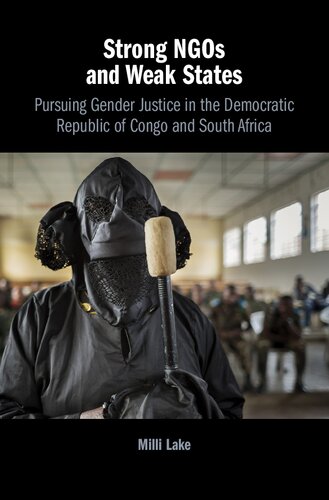Product desciption
Strong Ngos And Weak States Pursuing Gender Justice In The Democratic Republic Of The Congo And South Africa Milli Lake by Milli Lake 9781108297745, 9781108419376, 1108297749, 1108419372 instant download after payment.
Over the past decade, DR Congo and South Africa have attracted global attention for high rates of sexual and gender-based violence. Why is it that courts in eastern DR Congo have offered a robust judicial response, prioritizing gender crimes despite considerable logistical challenges, whilst courts in South Africa, home to a far stronger legal infrastructure and human rights record, have failed to provide justice to victims of similar crimes? Lake shows that state fragility in DR Congo has created openings for human rights NGOs to influence legal processes in ways that have proved impossible in countries like South Africa, where the state is stronger. Yet exploiting opportunities presented by state fragility to pursue narrow human rights goals invites a host of new challenges. Strong NGOs and Weak States documents the promises and pitfalls of human rights and rule of law advocacy undertaken by NGOs in strong and weak states alike.
Review
'In her meticulously researched book, Milli Lake illuminates a difficult topic with both rigor and compassion, questioning many preconceptions about justice and gender based violence in some of the world's most challenged courts.' Kathryn Sikkink, Ryan Family Professor, Kennedy School of Government, Harvard University
'Milli Lake's book counterintuitively demonstrates that precisely the lack of state presence in the eastern Democratic Republic of Congo - a quintessential failed state - enabled courts backed by strong NGOs to tackle gender crimes. In contrast, strong states such as South Africa do not necessarily promote justice for victims of sexual and gender-based violence. Thus, Lake presents a very convincing case that areas of limited statehood can actually be well governed, while statehood as such is no panacea for justice. A must read for anybody interested in the governability of failed and fragile states!' Thomas Risse, Freie Universität Berlin, Germany
'Journalists and politicians often call Congo the 'rape capital of the world'. Milli Lake develops a fascinating, original, theoretically-rich, and nuanced analysis of this controversial issue. She goes beyond the clichés to reveal how, in contrast to South Africa, human rights activists in Congo have been strikingly innovative, and local courts surprisingly progressive, despite the tremendous challenges they face in their day-to-day work.' Séverine Autesserre, author of Peaceland and The Trouble With the Congo
Book Description
Why have courts in eastern Democratic Republic of the Congo (DR Congo) offered robust responses to sexual and gender-based violence, while South African courts failed to take gender justice seriously despite strong legal infrastructure? As Lake explains, state weakness can actually create opportunities for NGOs and activists to influence local human rights law and practice.


